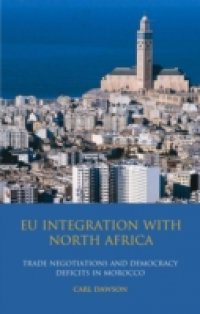Trade negotiations and agreements have been increasingly contentious, provoking protest, hardening opposing points of view and widely criticized for favouring rich countries over poor. The Association Agreement between Morocco and the European Union in 1995, part of a regional initiative, the Euro-Mediterranean Partnership (or "Barcelona process"), is no exception. The result of negotiations over three years, the free trade provisions of the agreement seemed unfavourable for Morocco: they largely excluded agriculture, opened the Moroccan market to competition from EU non-agricultural products (Morocco had achieved equivalent access to EU markets decades earlier), and EU funding for Moroccan company upgrading fell far short of expectations. Here Dawson shows how the political systems of Morocco and the European Union led to the EU proposing, and Morocco accepting, such a sub-optimal agreement. _x000D__x000D_Through detailed and rich testimony of key players involved in the negotiations from 1992 till 1995, Dawson argues that Morocco may have achieved a better free trade deal had it been an open and democratic system during the period of negotiations. The closed and elitist nature of the Moroccan negotiation and ratification process meant that the official negotiating position did not account for the full range of interests affected by trade liberalization; nor could the hand of the Moroccan negotiators be strengthened by the threat of ratification failure - the prospect that dissident groups might reject the final agreement in Parliament, in a referendum, or in the streets. The European Union negotiation and ratification process, although open and democratic, was skewed by the lack of significant participation by most member states. Only France, Spain and Italy participated intensively, a situation that ensured the protection of powerful national lobbies (primarily Spanish farmers and fishermen) at the expense of Morocco and of EU economic development objectives for North Africa. _x000D__x000D_The convergence of minimal participation in Morocco and significant but wholly inadequate participation in the European Union led to an agreement favoring narrow European sectoral interests at the expense of the broader vision of the Euro-Mediterranean partnership. An insightful analysis of the negotiation process, 'EU Integration with North Africa' elucidates the underpinnings of the global economic order; it will be valuable for those concerned with international relations, globalisation and the EU, especially North Africa.

